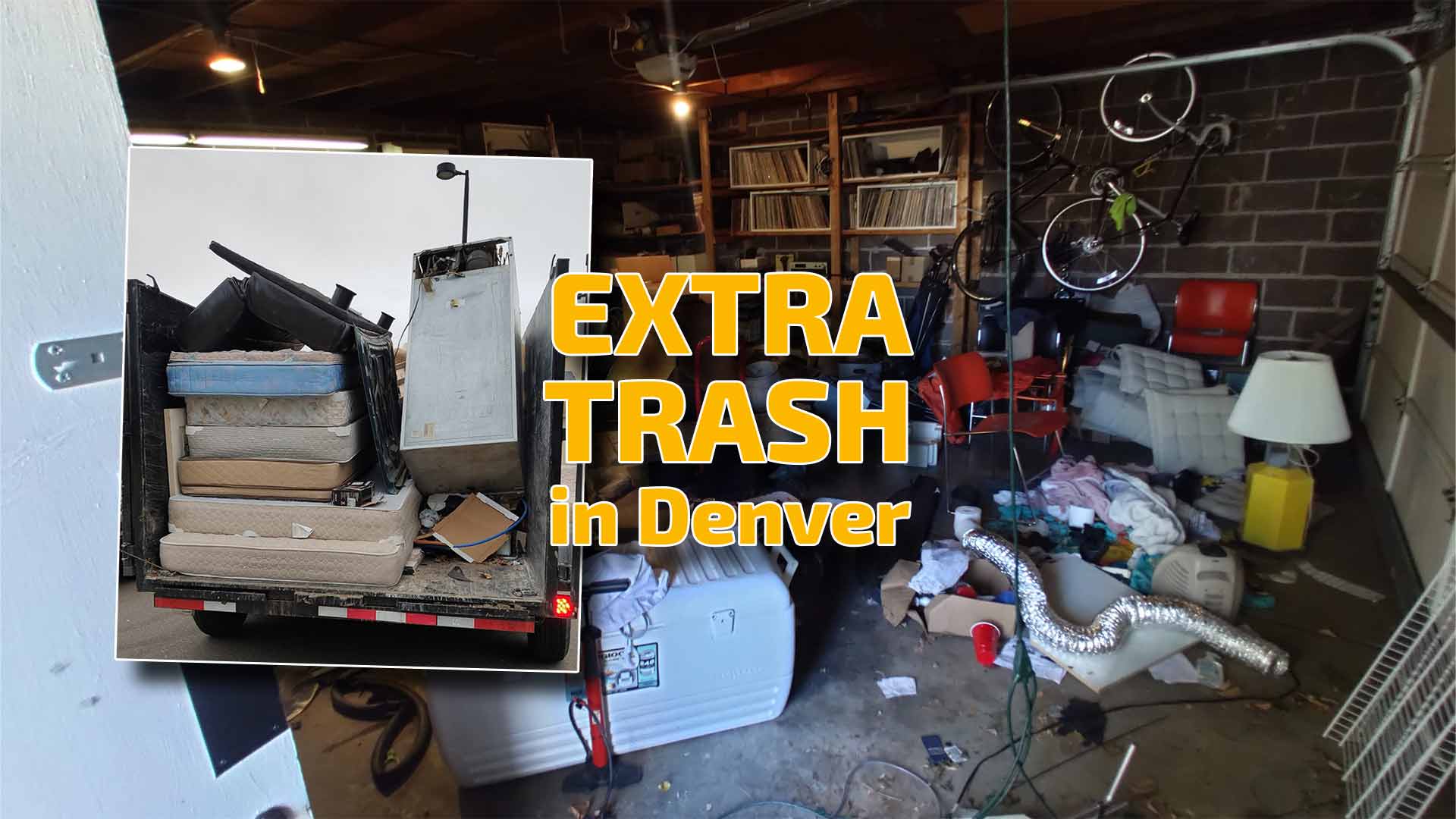 Denver’s Extra Trash Problem: A Growing Concern
Denver’s Extra Trash Problem: A Growing Concern
Denver, Colorado, is a bustling city known for its scenic beauty and vibrant community. However, its growing population and increasing events have brought a significant challenge: managing extra trash. Overflowing garbage bins, especially during holidays, festivals, and peak construction periods, create eyesores, pose health hazards, and strain the city’s waste management systems.
The Importance of Effective Waste Management
Effective trash management is essential to maintain Denver’s environmental health and urban appeal. Poorly managed trash contributes to pollution, pest infestations, and potential health risks. It also clogs landfills, undermining the city’s sustainability efforts. Tackling this problem is crucial for safeguarding Denver’s ecosystem and supporting its vision of becoming a zero-waste city by 2030.
Goals of This Article
This comprehensive guide explores the Denver trash overload issue, including its root causes, the city’s current waste management measures, and potential solutions. The article delves into the regulations, challenges, and opportunities in managing trash, from residential waste surges during holidays to commercial and industrial trash overflow. It highlights how community efforts and services like Super Junkers can play a pivotal role in creating a cleaner, greener Denver.
By the end, you’ll gain a deeper understanding of managing overloaded trash effectively and learn how innovative solutions can make Denver a leader in sustainable waste management.
 Understanding the Issue
Understanding the Issue
What is Extra Trash, and Where Does It Come From?
Extra trash refers to waste that exceeds the regular capacity of garbage bins and scheduled pickups. It stems from various sources:
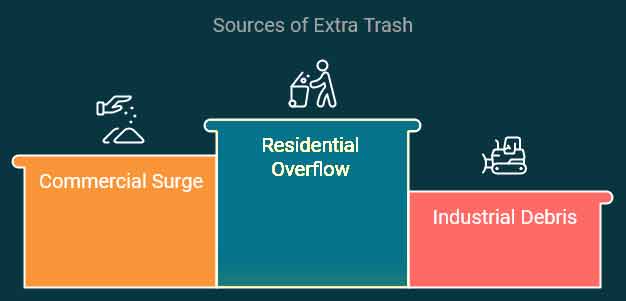
- Residential Sources: Events like holidays, parties, home renovations, and moving days often result in overflowing garbage bins. Typical items include furniture, appliances, and yard waste.
- Commercial Sources: Businesses generate substantial overloaded trash during peak seasons or events. Restaurants, retail stores, and offices contribute to this surge with packaging waste, food leftovers, and promotional materials.
- Industrial Sources: Construction and demolition debris, including concrete, metals, and wood, contribute to Denver’s trash problem. These materials require special handling and disposal.
Denver’s Waste Statistics
Denver produces thousands of tons of municipal solid waste annually, with extra trash contributing significantly during events and peak periods. Despite strong recycling efforts, the city faces challenges in diverting enough waste from landfills to meet its zero-waste goals. Additional data can illustrate the impact of trash and the need for innovative solutions.
City Ordinances and Regulations
Denver has robust waste management policies to curb illegal dumping and encourage sustainable practices. Key regulations include:
- Volume-Based Trash Pricing: This system charges residents based on their selected bin size, incentivizing waste reduction.
- Recycling Mandates: Residents and businesses are required to separate recyclable materials.
- Illegal Dumping Penalties: Fines are imposed for unauthorized disposal of items like furniture and construction debris.
While effective, these measures are insufficient to manage sudden waste surges. Addressing gaps requires collaborative efforts between the city, residents, and private services like Super Junkers.
 City Services for Trash Management
City Services for Trash Management
How Denver Handles Trash Collection
The city of Denver provides comprehensive waste management services, including weekly trash collection for residential areas. Under the volume-based pricing system, households are offered various bin sizes, encouraging residents to generate less waste by aligning fees with trash volume.
Volume-Based Trash Pricing System
Introduced to promote sustainability, this pricing model charges households $9, $13, or $21 monthly based on their chosen bin size (35, 65, or 95 gallons). The system reduces waste generation and funds recycling and composting programs, creating a more sustainable waste management cycle.
Special Services for a Cleaner City
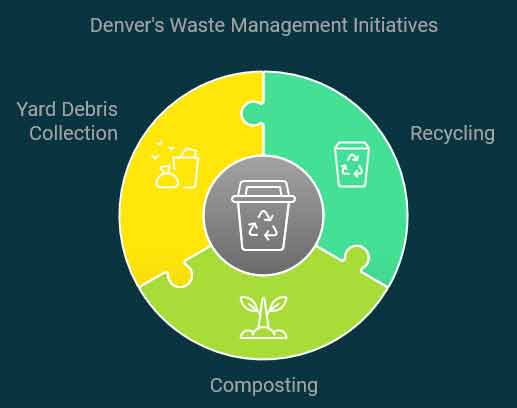
Denver goes beyond essential trash collection by offering the following programs:
- Recycling: Residents can recycle paper, glass, metals, and plastics through city-provided bins.
- Composting: Organic waste, including food scraps and yard debris, is processed into compost, reducing landfill contributions.
- Yard Debris Collection: Seasonal drives collect tree branches, leaves, and garden waste.
While these services are robust, they often fall short during high-demand periods like holidays or large-scale events. Overflowing bins and unscheduled trash require additional attention, creating opportunities for private services like Super Junkers to fill the gap.
By working alongside city programs, Denver residents and businesses can better manage trash and support a more sustainable community.
The Challenges of Overload Trash Bins
Why Too Much Trash is a Growing Problem in Denver
Denver’s vibrant city life, bustling events, and rapid growth contribute to a pressing issue: managing trash. Overloaded garbage bins during holidays and festivals, illegal dumping, and excess waste’s environmental and health hazards all strain the city’s resources. These challenges demand innovative solutions and active community involvement.
Overloaded Garbage Bins During Events and Holidays
Like the holiday season, seasonal peaks often result in excessive waste generation. Large-scale events, festivals, and family gatherings produce extra trash beyond the capacity of regular garbage bins. This overflow creates unsightly neighborhoods and increases the risk of litter spreading through wind and animals.
For instance, Denver’s iconic events, such as the Great American Beer Festival, attract thousands of attendees, generating mountains of waste. The city’s regular collection schedule often fails to address these surges, leaving bins overflowing and streets cluttered.
 Illegal Dumping Issues and Enforcement
Illegal Dumping Issues and Enforcement
Illegal dumping compounds Denver’s trash problems. Residents and businesses often discard unwanted items—such as furniture, appliances, or hazardous materials—in unauthorized locations to avoid disposal fees. This behavior harms the environment, poses health risks, and incurs significant cleanup costs for the city.
Denver has implemented strict ordinances to combat illegal dumping, with fines and penalties for violators. However, enforcement remains challenging due to limited resources and difficulty tracking offenders. The city also struggles to raise awareness about proper disposal methods, leaving gaps in compliance.
Environmental and Health Concerns
Excess trash, improperly managed, can lead to serious environmental and health issues. Overflowing garbage bins attract pests like rodents and insects, which can spread diseases. Decaying waste emits unpleasant odors and harmful gases, contributing to air pollution.
Additionally, improperly disposed of hazardous materials—such as batteries, electronics, or chemicals—can contaminate soil and water, affecting Denver’s ecosystems. The accumulation of non-recyclable plastics exacerbates the city’s landfill problems, requiring years to decompose.
Costs of Extra Trash Collection and Disposal
Managing extra trash comes at a steep cost. The city allocates significant resources to address overflow, illegal dumping, and the need for additional pickup services during peak times. These costs are often passed on to residents through increased fees, creating taxpayer dissatisfaction.
For businesses, extra trash means higher waste management expenses. Construction sites and large-scale commercial operations face hefty fees for disposing of debris and industrial waste, prompting some to seek alternative solutions outside city-provided services.
Addressing these challenges with Better Solutions Despite Denver’s efforts to enforce regulations and promote waste reduction, gaps persist in managing extra trash effectively. Alternative services like those offered by Super Junkers provide a much-needed bridge, ensuring timely, eco-friendly disposal and alleviating the burden on city systems.
 Super Junkers: A Local Solution
Super Junkers: A Local Solution
What is Super Junkers? Super Junkers is Denver’s trusted name in junk removal, offering a comprehensive range of services for residential, commercial, and industrial clients. With over seven years of experience, Super Junkers handles extra trash, from overflowing garbage bins to bulky items like furniture and appliances. Known for their eco-friendly practices and quick response times, they’ve become a go-to solution for managing waste beyond the city’s standard services.
A Comparison to City Services
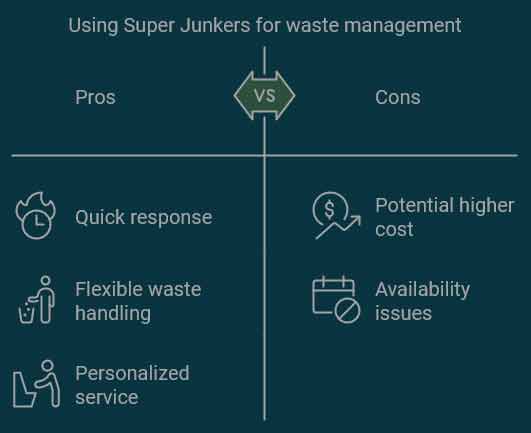
While Denver provides solid waste management services, Super Junkers offers several advantages that set them apart:
- Speed and Convenience: City services often operate on fixed schedules, which may not accommodate urgent needs. Super Junkers responds swiftly, promptly providing same-day or next-day pickups to tackle trash.
- Flexibility: Unlike city services, which restrict certain types of waste, Super Junkers handles a broader range of items, including construction debris, electronics, and hazardous materials.
- Personalized Service: With a customer-focused approach, Super Junkers tailors their services to meet each client’s specific needs, ensuring satisfaction.
Eco-Friendly Disposal Methods
Sustainability is at the core of Super Junkers’ mission. They prioritize eco-friendly disposal, diverting usable items from landfills through recycling and donation. Electronics, appliances, and furniture are assessed for reuse, reducing waste and benefiting local charities.
By working with recycling facilities and donation centers, Super Junkers ensures that Denver’s overloaded trash is handled responsibly. This approach minimizes environmental impact and aligns with the city’s sustainability goals.
Donation Pickups
Super Junkers goes beyond traditional junk removal by offering donation pickup services. Many items discarded as trash still hold value and can benefit those in need. Super Junkers collaborates with local organizations to repurpose furniture, clothing, and household items, giving them a second life.
 Sustainable Practices and Community Involvement
Sustainable Practices and Community Involvement
Embracing Sustainability: The Key to Tackling Denver’s Trash
Denver residents and businesses can play a vital role in reducing the city’s waste footprint. Sustainable practices like reducing, reusing, and recycling help decrease the volume of extra trash, protect the environment, and build a cleaner, healthier community.
The Importance of Reducing, Reusing, and Recycling
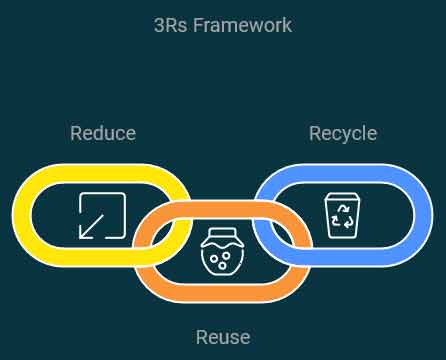
The “3Rs” framework—reduce, reuse, recycle—is foundational to effective waste management.
- Reduce: The most impactful strategy is to cut waste at its source. Residents can significantly lower their trash output by choosing products with minimal packaging and avoiding single-use plastics.
- Reuse: Items like glass jars, fabric shopping bags, and old furniture can be repurposed rather than discarded. Reuse extends the life of materials, reducing demand for new resources and lowering environmental impact.
- Recycle: Denver has robust recycling programs, but many recyclable materials remain in landfills due to improper disposal. Sorting paper, glass, metals, and plastics correctly ensures they are processed into new products.
Tips for Managing Extra Trash at Home
For households, managing overloaded trash doesn’t have to be daunting. Here are practical tips to make a difference:
- Plan for Events: During holidays or gatherings, rent an additional trash bin or schedule an extra pickup to avoid overflow.
- Compost Organic Waste: Kitchen scraps and yard waste can be composted, turning potential trash into nutrient-rich soil.
- Donate or Sell Items: Furniture, clothing, and electronics can often find a second life through donation or resale rather than being trashed.
- Use Eco-Friendly Products: Opt for biodegradable and compostable products, reducing non-recyclable waste.
 Business Strategies for Managing Big Trash
Business Strategies for Managing Big Trash
Commercial entities often generate significant waste, but they can adopt sustainable practices to mitigate the impact:
- Conduct Waste Audits: Analyze the type and quantity of waste produced to identify opportunities for reduction and recycling.
- Partner with Recycling Services: Establish contracts with recycling programs to ensure paper, packaging, and metals are diverted from landfills.
- Encourage Green Practices: Provide employees with reusable containers and educate them about sustainable habits.
- Engage Junk Removal Experts: Businesses can collaborate with services like Super Junkers for efficient and eco-friendly disposal of large-scale waste.
The Role of Community Programs and Education
Community involvement is critical to successful waste management. Denver’s recycling and composting initiatives provide residents with the tools to make a positive impact. Education campaigns emphasize the importance of proper disposal, recycling guidelines, and sustainable habits.
Local non-profits and neighborhood groups often organize cleanup drives, workshops, and informational sessions. These efforts foster community spirit while addressing trash challenges. Collaboration between residents, businesses, and service providers like Super Junkers strengthens Denver’s commitment to sustainability.
Future of Trash Management in Denver
Innovating for a Waste-Free Denver
As Denver grows, the need for innovative and efficient trash management solutions becomes increasingly urgent. Emerging technologies, forward-thinking policies, and community engagement pave the way for a more sustainable future.
Emerging Technologies in Waste Management
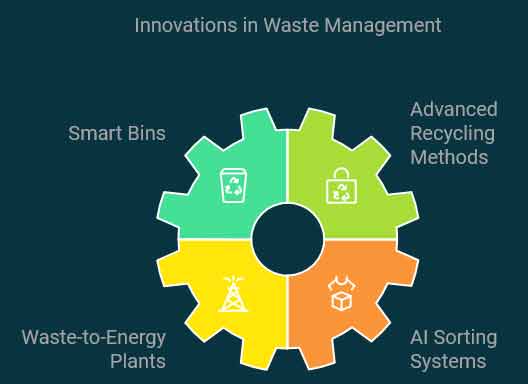
Modern waste management is evolving, with technology playing a significant role:
- Smart Bins: Equipped with sensors, these bins monitor fill levels and optimize collection schedules, reducing inefficiencies.
- Advanced Recycling Methods: Technologies like chemical recycling break down plastics into their base components, allowing more materials to be reused.
- Waste-to-Energy Plants: Converting non-recyclable trash into energy offers a cleaner alternative to traditional landfills.
- AI Sorting Systems: Automated facilities use artificial intelligence to sort recyclables faster and more accurately.
These innovations improve waste management and reduce Denver’s carbon footprint.
Policy Recommendations for Denver
Denver can further enhance its trash management through targeted policies:
- Expand Volume-Based Pricing: Extend the pay-as-you-throw model to encourage waste reduction.
- Mandate Commercial Recycling: Businesses must adopt recycling programs as part of their waste disposal plans.
- Invest in Composting Infrastructure: Increase the availability of composting facilities to handle organic waste more efficiently.
- Launch Public Awareness Campaigns: Educate residents about the benefits of sustainable waste practices and available city resources.
The Role of Businesses Like Super Junkers
Super Junkers is already shaping the future of trash management in Denver. Their swift, eco-friendly services complement city efforts, addressing gaps in handling overloaded trash and offering donation pickups to minimize waste. By collaborating with recycling centers and supporting local charities, Super Junkers promotes a circular economy where waste is transformed into valuable resources.
Businesses like Super Junkers will continue to be integral as Denver advances its sustainability goals, ensuring cleaner neighborhoods and a healthier environment.
 Conclusion
Conclusion
Working Together for a Cleaner Denver
Managing loads of trash is a shared responsibility that requires collaboration between residents, businesses, and city services. Denver faces unique challenges, from overflowing garbage bins during events to illegal dumping and environmental hazards. However, sustainable practices, innovative technologies, and robust community involvement can effectively address these challenges.
Super Junkers plays a pivotal role in filling the gaps in waste management. Their services provide Denverites with fast, flexible, and eco-friendly solutions for handling tons of trash. Super Junkers exemplifies how businesses can support a cleaner, greener city, from recycling initiatives to donation pickups.
Now is the time for action. Denver residents can adopt sustainable habits like reducing, reusing, and recycling to minimize their waste impact. Businesses can implement green practices and collaborate with experts like Super Junkers to manage their trash responsibly. City policymakers can drive progress with forward-thinking regulations and investments in technology.
Let’s work together to ensure Denver remains a vibrant, beautiful city for future generations. Committing to sustainable waste management can create a healthier, more resilient community. Contact Super Junkers today and take the first step toward a cleaner Denver.

